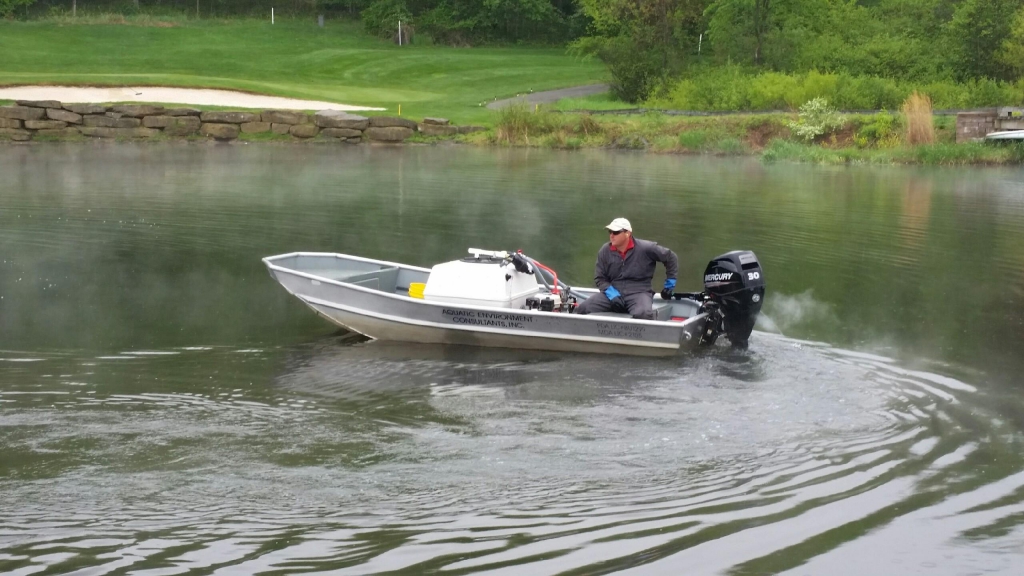When we hear bacteria, we think of undercooked hamburgers and bad stuff that grows on your chicken if you leave it out on the counter too long. These are examples of bacteria that one would not want to get close to because they are potentially dangerous. However, while there are bad bacteria, there are also many bacteria that are beneficial. We have bacteria in our bodies that help us digest our food and carry out fundamental processes in our daily lives. We would not have cheese without bacteria, and any yogurt lovers out there eat millions of live and active bacteria in every container. Healthy bacteria also lives in our waterways too, which help contribute to a healthy aquatic ecosystem.
Beneficial Bacteria In Lakes and Streams
Much like the natural processes of decay in a forest (trees, leaves etc.), a pond or lake bottom has constant decay occurring as well. There are naturally occurring bacteria that aid in the microbial degradation of organic material on the pond or lake bottom. Without the action of these microorganisms, the processes that occur in a waterbody can be much slower or nonexistent. They help to maintain a healthy balance in a waterbody.
The benefits of having an abundant amount of healthy bacteria in waterways include:
- The digestion of sediment or lower nutrient load, both of which can lead to less plant and algae growth.
- Reducing algae blooms in ponds and lakes
- These microbial agents of decay are an important part of the ecosystem because they convert detritus (dead and decaying matter) and organic materials into some important needed nutrients. These include nutrients like nitrate, phosphate, and sulfate.
- Helps water sources restore healthy oxygen levels to keep them looking clear.
- An abundant amount of healthy bacteria in water sources leads to a reduction in odor from the water source.
Adding Bacteria to Waterways: A Human Solution
What happens when somebody is lacking a necessary vitamin in their diet? Generally, that person finds a vitamin replacement that they can take in the form of a pill or some other over-the-counter medication. The same idea also applies to waterways. If a body of water is showing signs of being unhealthy, it is likely lacking important necessary healthy bacteria.
Over the past few years, there have been many new bacterial products on the market to hasten or increase these processes that take place in a waterbody. The bacteria used are naturally occurring bacteria that would be found in your pond or lake, simply bolstering the existing populations. These products are meant primarily for a pond owner. The sheer volume of a lake makes it costly and cumbersome to handle the amount of product needed on a larger scale. In general, you simply add the bacteria to your pond based on the acre-feet or volume of water you have and the bacteria and enzymes do the rest.
But how does this process work exactly and why should pond or lake owners buy this healthy bacteria? Is it really going to have a tremendous benefit to the water source?
The short answer is yes. Keep reading the following section to learn why!
What Adding Healthy Bacteria To Waterways Can Do For You
Imagine clear, crisp water that catches the reflections of your surroundings just right. The lush around the waterbed is vibrant and thriving and there is not much that you have to do to keep it this way.
Now, stop imaging. What was just described can be reality. What you just envisioned is the solution that healthy bacteria can be for damaged water sources! By adding healthy amounts of good bacteria to water sources, potentially harmful algae and other microorganisms are deprived of nutrients and therefore are not able to thrive and live off of the water.
This is why having an abundant amount of healthy bacteria present in waterways is essential because it literally can save a pond, lake, or stream from becoming naturally polluted.
Important Considerations Before Taking Action
As with anything, there are factors to take into consideration before you buy and apply any beneficial bacteria to your pond.
Frequency Bacteria Needs to Be Administered
The bacterial products you use for your pond or lake need to be administered frequently to maintain the desired levels. Determining how frequently depends on a number of factors. One of the most important factors is the inflow rate of your body of water. For example, if a pond has a high inflow, the bacteria will be quickly diluted and will need to be supplemented more frequently.
Oxygen: Aerobic vs Anaerobic Bacteria
Another consideration for bacteria is oxygen. There are aerobic and anaerobic bacteria. Aerobic bacteria carry out their processes in an oxygen-rich environment, whereas anaerobic do not need oxygen. Most of the bacteria used in the products will function under lower oxygen conditions but are more effective with higher oxygen levels. Supplemental aeration, such as a diffused aeration system or a floating fountain, will help maintain higher oxygen levels. With higher oxygen levels, the aerobic strains of bacteria will then be more productive. The temperature of the water will affect the efficacy of the products, as well. During the warmer months, biological activity will be more prolific. Manufacturers of these products are, however; always working to make advancements in their products and have special blends that can be used throughout most of the year.
The Bottom Line on Healthy Bacteria
Bacterial and biological products are a great addition to the management of any waterbody when managed correctly. As with any problem, there may be more than one solution or the need for integrating several techniques to correct the issue. The best thing to do if you are considering adding healthy bacteria to your waterway is to contact an expert. Not only can experts let you know if the conditions are right to use healthy bacteria as a tool to keep your water source healthy, but experts also have lots of recommendations they can make for treating the issue and keeping it under control.
Interested in adding bacteria to your pond or lake management plan? Contact the experts at Aquatic Environment Consultants (AEC)! We’re happy to tell you more about what bacteria can do for your body of water and answer any other questions you may have. Get in touch today!


Add Comment